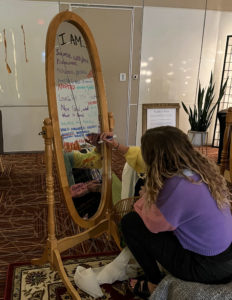If someone asked you to define who you are, what would you say? Your first instinct may be to share some facts about yourself such as your family, career, hobbies, or even some physical attributes such as ethnicity or gender. These things are not necessarily bad in and of themselves; however, none of these attributes are worthy enough for you to place your identity and value in. Yet, every day, many do.
The other week, I had what one could consider a fairly bad day. On this day, I accidentally dropped my roommate’s Lego set that he had spent a week building, then I experienced strife in a different relationship. In the midst of feeling overwhelmed and discouraged, I returned to an old sin. I believe that scenarios like this one are common for many, even if they come in different forms. In the book The Cure, co-authored by John Lynch, Bruce McNicol, and Bill Thrall, the Room of Grace is introduced as a place where broken people can come and be loved in the midst of their brokenness. The Cure uses the illustration of a room to share how God loves us despite our flaws and imperfections. Because we are a new creation in Christ (2 Corinthians 5:17), we no longer have to look to the things of this world to define who we are. Instead, we look to Christ alone.

Some people may not feel like they need a savior, but if they are looking to anything but Christ as their foundation, it will fail them (Matthew 7:24-27). For others, they believe that failing to do what’s right means not being a good steward of the grace that God has given them, and they respond by beating themselves up in shame. They do so because they believe it will somehow help them to be worthy of Jesus’s death on the cross for them. Sadly, some find themselves stuck in this pattern that contradicts the Gospel.
I know that in my life, any time I stumble I have the choice to let my failure define me or to let God’s grace define me. This is because, in reality, God loved the world so much that he gave the life of his Son (John 3:16) so that we could know him (John 17:3). Jesus came and defeated death so that we could be free for eternity starting the moment we choose to put our faith in him (Galatians 5:1). God’s love cut so deep into our sin nature that he freed us in such a way that even when we stumble and fall, if we are in Christ, we are free (John 8:36).
Once we are in Christ, nothing else matters because we were created to know and abide in him (John 15:4). This may look like loving God through loving people; however, we do not love people in order to receive love, but because we are overflowing with Christ’s abundant love for us. In Christ, we have all the love we need and more. That’s what it looks like to live in the Room of Grace: we willingly receive Christ’s love in the midst of our brokenness. Not because we deserve it, but because by God’s grace we are able to receive it. In doing so, God’s love will redefine us from the inside out.
Simon Ray
Leesburg, Georgia
